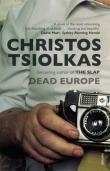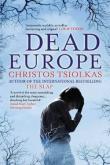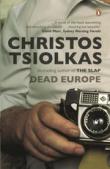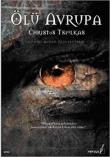AustLit
Latest Issues
AbstractHistoryArchive Description
Source: Manne, Robert. 'Dead Disturbing'. The Monthly. (June, 2005)
Adaptations
-
form
y
 Dead Europe
( dir. Tony Krawitz
)
Australia
:
See Saw Films
Porchlight Films
,
2012
Z1859546
2012
single work
film/TV
Dead Europe
( dir. Tony Krawitz
)
Australia
:
See Saw Films
Porchlight Films
,
2012
Z1859546
2012
single work
film/TV
'Isaac, a Greek Australian in his late 20s, spirals out of control when he's forced to confront his own family's cursed legacy on his first trip to Europe - with the continent's haunted past and troubled present pressing in on him.'
Source: Inside Film website
Notes
-
Dedication: For 'Mitsos' Litras and Dimitris Tsolkas, in gratitude.
-
Epigraph: To a saintly man
- So goes an Arab tale-
God said somewhat maliciously:
'Had I revealed to people
How great a sinner you are,
They could not praise you.'
'And I,' answered the pious one,
'Had I unveiled to them
How merciful you are,
They could not care for you.' (Czeslaw Milosz) -
The adaptation of Dead Europe began filming in Sydney in September, 2011.
Publication Details of Only Known VersionEarliest 2 Known Versions of
Other Formats
- Also sound recording.
Works about this Work
-
Queering Mateship : David Malouf and Christos Tsiolkas
2023
single work
criticism
— Appears in: The Cambridge Companion to the Australian Novel 2023; (p. 274-288)'David Malouf and Christos Tsiolkas represent very different generations of gay men with migrant backgrounds, but both use the novel form as a way of articulating gay experience. Malouf, born 1934, started out as a poet, and continued to publish poetry for his entire career. His work is exquisitely styled and highly verbally self-conscious. As opposed to the meditative, scholarly Malouf, Tsiolkas, born 1965, is far grittier and rancorous in his approach. Loaded (1995) details a world of drug use and casual sex, whereas Dead Europe (2005) overturns the traditional Australian nostalgia for and even pretention about continental Europe by examining its sordid post-Cold War reality. Though Malouf and Tsiolkas are very different writers, their concern with aesthetics, history, and what it might be to live in a community make their juxtaposition not just heuristic but inevitable. This chapter explores one convergence between them: their queering of mateship.' (Publication abstract)
-
Charting Tsiolkas’s Literary Development through Adaptations
2022
single work
criticism
— Appears in: Journal of Australian Studies , vol. 46 no. 1 2022; (p. 72-84)'Christos Tsiolkas has occupied an increasingly central position in the contemporary Australian literary and cultural imagination. Starting with his novel Loaded (1995), Tsiolkas’s fiction engages with subject matter that speaks to his personal experience as both a gay man of Greek heritage and a writer concerned with larger social and political issues affecting a multicultural Australia. Examples of recurring themes in Tsiolkas’s fiction include the irreconcilability of Greek and Australian identity, racial and class intolerance, emergent sexual consciousness, and the conflict between familial obligation and individual expression. In contrast to these arguably “reader-friendly” themes—that is, themes that are accessible to a wide and non-specialist audience—Tsiolkas’s early novels (Loaded; The Jesus Man, 1999; and Dead Europe, 2005) possess a subversive edge in how they explore obscenity and social transgression. However, the publication of Tsiolkas’s fourth novel, The Slap (2008), signalled a new phase in his career, in which the formal rawness of his prose and his uncompromising representation of extreme corporeal states gave way to a simplicity in his written expression that mirrored the growing topicality of his subject matter. This change in purpose mirrors the shift in both the reception of Tsiolkas the writer and of his fiction. Prior to The Slap, Tsiolkas was viewed as a “cult figure” who, though of some critical interest, neither captivated the attention of a mainstream audience nor was celebrated by the literary establishment as an “Australian” writer whose fiction reflected purportedly national interests. However, the critical and commercial success of The Slap has ensured that both Tsiolkas and his subsequent fiction have been (re)cast as pivotal sites of commentary on contemporary Australian class and racial politics. Put another way, Tsiolkas’s “increasing visibility … as a public intellectual, if not a literary celebrity”, has resulted in changes to the form, language and subject matter of his novels, and also the ways critics receive and understand his career.' (Publication abstract)
-
On Harrowing in Dead Europe
2022
single work
criticism
— Appears in: Journal of Australian Studies , vol. 46 no. 1 2022; (p. 60-71)'Dead Europe (2005) is a book about the harrowing of Isaac. The anti-Semitic logics of the novel inflect the familial curse that proceeds in the wake of Elias’s death, and the curse that haunts Isaac offers a re-emergence of a murderous anti-Semitic past. Yet this moment also confronts the critical reader with a choice: to embrace this supernatural motif of the curse or to shun it as psychopathology. Favouring the former, this article draws on the resources of Lacanian psychoanalysis and post-Marxist theory to analyse how this curse remains an exemplary trope. The argument will trace how Isaac is harrowed by the curse and, therein, ask what it means for Isaac to be harrowed. By looking again at the construction of the curse in Dead Europe, this article will examine some of the critical ideas that are uncovered by the novel’s supernaturalism.' (Publication abstract)
-
Grotesque Europe : The Gothic Grotesque and Anti-Semitic Stereotypes in Dead Europe
2022
single work
criticism
— Appears in: Journal of Australian Studies , vol. 46 no. 1 2022; (p. 45-59)'Christos Tsiolkas’s Gothic novel Dead Europe (2005) has been criticised by some for its offensive representation of Jewish characters, and lauded by others as an unflinching interrogation of historical and contemporary anti-Semitism. The Gothic genre more broadly has a difficult history of rendering the marginalised Other as monstrous, and while contemporary writers often experiment with Gothic tropes to challenge and disrupt such representations, as a non-Jewish writer, Tsiolkas uses the figure of the monstrous Jew in problematic ways. This article analyses Dead Europe’s use of the Gothic grotesque in depicting Jewish characters, arguing that the novel engages in an ethical critique of anti-Semitic stereotypes using the grotesque’s ambivalence, overdetermination and ability to compel attention through shock and disgust.' (Publication abstract)
-
“I Am Not yet Satisfied” : Desire and Violence in the Works of Christos Tsiolkas and Roberto Bolaño
2022
single work
criticism
— Appears in: Journal of Australian Studies , vol. 46 no. 1 2022; (p. 19-30)'From child prostitutes in Prague to wogs in suburban Melbourne, Christos Tsiolkas's fiction is full of characters defined by the desire for, discrimination against, and addiction to some form of Other. His work traces a libidinal economy that thrives where utopian ideals such as communism, cosmopolitanism and multiculturalism have failed to unify people around anything other than consumption. With particular attention to Dead Europe (2005) and Merciless Gods (2014), this article considers Tsiolkas's work alongside that of Roberto Bolaño, particularly 2666 (2004). Tsiolkas and Bolaño unearth the intersections between desire and violence across cultural, geopolitical and temporal borders. Their work offends because it implicates the subject in violence that is neither sensational nor exceptional. This violence is ongoing and without a clearly identifiable agent. Sometimes set against historical violence, such as the Holocaust, 9/11 or white Australian colonialism, it emerges in the backyard barbecues, drug-fuelled house parties and porn theatres that Tsiolkas's characters populate. This article uses Lacanian psychoanalysis to examine how Tsiolkas's work redistributes the violence from the pathological and geopolitical peripheries to the centre, disrupting Australian narratives of innocence and isolation and bringing together North and South, the Old World and the New.' (Publication abstract)
-
Unsettled By Europe's Dark Wasteland
2005
single work
review
— Appears in: The Weekend Australian , 28-29 May 2005; (p. 8-9)
— Review of Dead Europe 2005 single work novel -
A Taste of European Decay
2005
single work
review
— Appears in: The Age , 28 May 2005; (p. 4)
— Review of Dead Europe 2005 single work novel -
Dead Disturbing
2005
single work
review
— Appears in: The Monthly , June no. 2 2005; (p. 50-53)
— Review of Dead Europe 2005 single work novel -
Old World Order
2005
single work
review
— Appears in: The Bulletin , 14 June vol. 123 no. 6474 2005; (p. 68-69)
— Review of Dead Europe 2005 single work novel -
A Very Modern Ghost Story
2005
single work
review
— Appears in: Australian Book Review , June-July no. 272 2005; (p. 45)
— Review of Dead Europe 2005 single work novel -
European Vocation
2005
single work
column
— Appears in: The Sydney Morning Herald , 18-19 June 2005; (p. 22-23) -
Wrestling Demons
2005
single work
column
— Appears in: The Advertiser , 18 June 2005; (p. 11) -
A Fortunate Son
2005
single work
column
— Appears in: The Sunday Age , 3 July 2005; (p. 20) -
The Year's Work in Fiction
2005
single work
review
— Appears in: Westerly , November vol. 50 no. 2005; (p. 56-67) Shortlisted books for the 2004-2005 Miles Franklin Literary Award. -
The Spectres Haunting Dead Europe
2005
single work
criticism
— Appears in: Overland , Summer no. 181 2005; (p. 26-31)
Awards
- 2006 winner The Age Book of the Year Award — Fiction Prize
- 2006 shortlisted ASAL Awards — ALS Gold Medal
- 2006 shortlisted New South Wales Premier's Literary Awards — Christina Stead Prize for Fiction
- 2006 longlisted Miles Franklin Literary Award
- 2006 inaugural winner Melbourne Prize — Best Writing Award
- Europe,
- Melbourne, Victoria,
- 1900-1999







